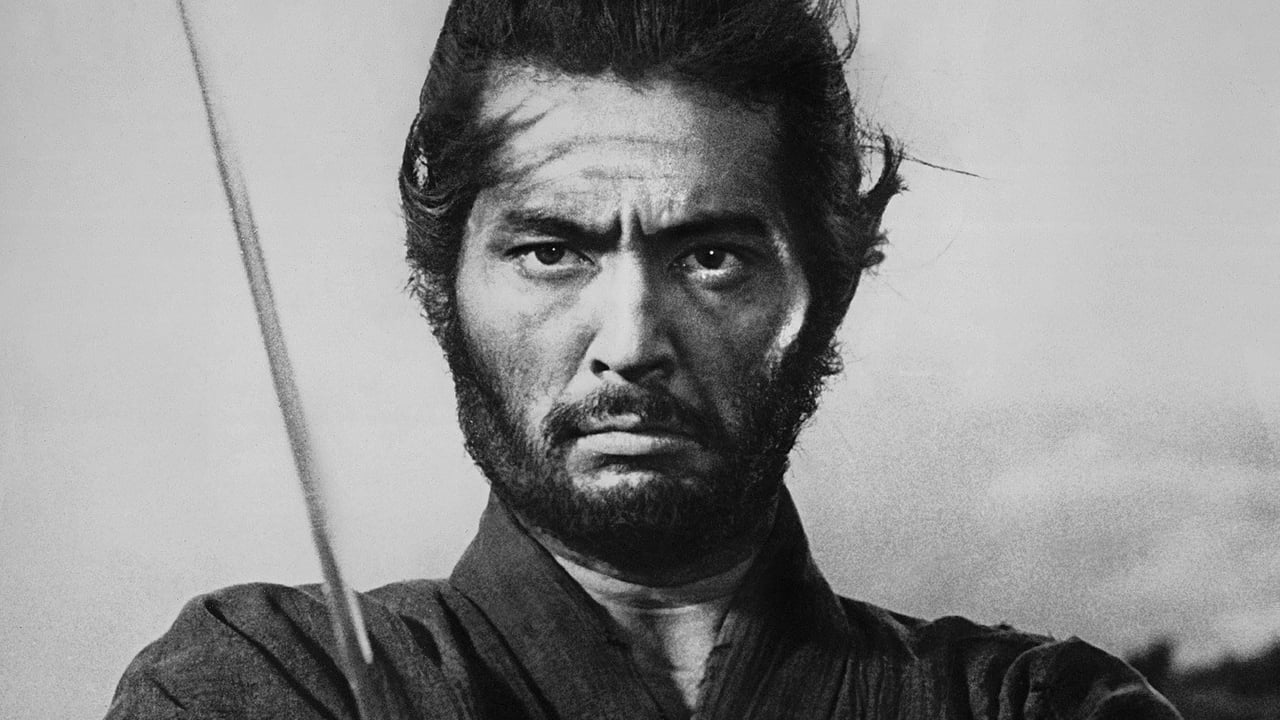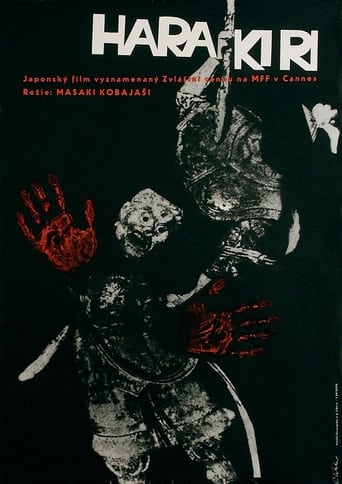

Unlike all the Kurosawa films I've seen, this one has a principal protagonist that announces his intention early in the story and then takes the viewer on a stunning journey of revenge that's entirely unexpected. Director Masaki Kobayashi prepares the viewer with a preliminary accounting of the fate of thousands of unemployed Samurai as a result of the 17th Century dissolution of the Japanese Shogunate. Masterless Samurai, or ronin, appear at the doorstep of a feudal lord requesting a place in which to perform ritual suicide, but for the dishonorable, this effort is merely a ploy to accept some small token of monetary value before moving on. "Harakiri" tells the story of two such ronin, and until we learn the true relationship of both men to each other, the viewer is at a loss to understand the real motivation of Hanshiro Tsugumo (Tatsuya Nakadai). With frequent forays into the past utilizing a series of flashbacks, Tsugumo relates the story of his son-in-law, helpless in the face of his wife's deteriorating physical condition and unable to seek medical attention for their sick baby due to lack of resources. What I found quite clever about the story was the absence of the three men Tsugumo called for to be his seconds for the purpose of hara-kiri. One realizes that it can't be simple coincidence that none of these men are available, as the story swerves to a desperate climax that pits Tsugumo against the entire House of Iyi. What would have been a tremendous let down in the story is avoided when Tsugumo follows through on his original mission, unable to physically overpower all the retainers employed by the clan's Master. So many films have the story's hero defeat an overwhelming number of rival opponents that it reduces the credibility factor to zero. At the point Tsugumo knows he can no longer pursue a fight strategy, he takes his life in the ritual manner. For followers of Japanese cinema, this film is a must see, with it's emphasis on honor, loyalty and embracing the truth of one's convictions. Tsugumo's unselfish final act unmasks the hypocrisy of the feudal lord's position, and mocks the cowardice of it's counselor Saito (Rentarô Mikuni). An appropriate amount of swordplay attends the story without becoming excessive, allowing for the more subtle aspects of Tsugumo's strategy to take over the narrative, which it does in compelling fashion.
... View MoreKobayashi making a superb Samurai film in the early '60s is like David Vs. Goliath. Kurosawa was on top of his game at this time, and somehow Masaki Kobayashi managed to create a Samurai film on par with the quality of Kurosawa, while staying true to his own style and merit instead of copying what others did before him.The first thing that struck me was that this film, more than 50 years later, still looks fantastic. Especially the great use of high contrast lighting, something you barely see in Japanese productions, set the tone both visually and thematically. The director of photography uses a lot of symmetric shots which look beautiful but tell a story as well. For me the highlight of this film was Motome Chijiiwa's seppuku. This scene was shocking, absurd and also very unpredictable. Excellent editing and cinematography created an unforgettable, yet uncomfortable moment. The turn of events, which slowly unfold as the film progresses is unexpected and will surprise you. But most of all, it will impress you. The director uses some very (without giving too much away) notable techniques to strengthen the effect.Tatsuya Nakadai, one of the greats in Samurai cinema, has some of the most amazing body language you will ever see in movies! I noticed how much work and detail he put into this character by not focusing on his eyes, but rather on his feet - which show that he really is portraying a Samurai. My only flaw is that the beginning of the film, the first twenty minutes or so, does not set the tone which I found to be a bit confusing and off putting.This is one of the greatest films from the golden age of Japanese cinema. It holds up very well and you will walk away very satisfied. If you get the chance, go watch it!
... View MoreHarakiri is a must see film. A ronin's appearance bears much more significance than it seems at first glance. As his tale unfolds, the tension in the film can be felt as it grows and grows incredibly until it is nearly unbearable. When the tension breaks in the showdowns between our hero and the samurai of the house of Iyi, it is with a vitality that bursts from the screen. The ending is incredible, tying together all the themes in a bloodbath that offers no hope that this will not happen again. The selfish and cruel house of Iyi grows in stature and there seems to be no prospect of betterment for the honourable warriors. The film exposes the bushido code as a farse wherein the honourable are exploited by the selfish. Incredibly shot, written, acted, it is an astounding achievement by director Masaki Kobayashi. Go see it at your next opportunity.
... View MoreThis has to be the best movie I have seen in a while. Good luck to me that I would like to pass on to you.We have two warring narrators. The first begins the film as an entry in his journal as local governor of a wealthy country estate. The film is closed with him finishing his entry, some days later. This official narrative deviates from what we see at the end.His story: one, then a second unattached ronin appeal to commit suicide in their courtyard. The first of these it is plain is just looking to be paid to leave, but our narrator is very strict about cleaving to that ronin's story. If he says he wants to kill himself, well then he must. This poor man had sold his sword and was now carrying bamboo, and it is this that he was forced to use. The resulting death is disturbing.So midway in the film, we have a samurai who has suffered because he was forced to live his story, forced by the narrator-governor who we later watch not live the story he has created and instead change it to suit.Now along comes an older samurai with the same request. He is dealt with in the same manner, but insists on telling a story to the assembled household before killing himself. He tells an amazing story: a fall from grace of his master, the dissolution of the household, poverty. His frail daughter and her son lay dying without a few coins for a doctor. The man's son is his daughter's husband, and it is he that came and was forced to die. The wife and son do as well, shortly after. Details of that death were told by the governor to the elder samurai earlier, though known because of the mocking way the body was returned.Until now, we have a classic case of warring narrative. We have the captive audience assembled. One storyteller is an official, so much so that he controls the official version of the film's story. The other has power in his gritty, true story. That story, incidentally is very close to what I consider noir: a random innocent fellow is cast in circumstances that seem full of circumstance and accident. The events of his life are played out not as they would in real life but as they would in a fictional life in a story told by others.Truth versus power in a struggle for the story of the film, essentially a struggle for the allegiance of the outer audience: us.The two beings as they face off are perfect in small mannerisms belying tension.Then slowly, the governor's world explodes as we learn new bits of the elder ronin's story of recent events. Many die.We (the audience) and control of all the cinematic effects was won by the ronin. Our governor is seen at the end writing the official account to be seen by his master that for his safety eradicates all story on both sides. The main actor, the winner, features in some of Kurosawa's best work as well.
... View More